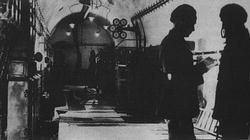 |
| 01/09/1939 | Britain and France, instead of immediately declaring war against Germany look to Mussolini who had proposed an international conference to revise the Versailles treaty terms. In France, general mobilisation declared. |
| 02/09/1939 | Hitler indicates to the Britain and France that he would withdraw from Poland provided that he was allowed to retain Danzig and the Polish Corridor. This was dismissed and a joint ultimatum was given to Germany to withdraw her troops from Poland within twelve hours or find herself at war with Britain and France. |
| 03/09/1939 | After Germany rejects the Anglo-French ultimatum of 1st September, which called for the withdrawal of all German forces from Poland, France declares war on Germany. |
| 05/09/1939 | French forces begin a limited offensive towards Saarbrücken. |
| 06/09/1939 | General Smuts wins cabinet battle in South Africa and declares war on Germany. |
| 07/09/1939 | Nine divisions of the French Army penetrate in to the Saarland, but their advance is very slow and no effort is made to attack the 'Westwall' itself. |
| 09/09/1939 | Advance elements of the BEF begin to a arrive in France. |
| 11/09/1939 | Arrival of first British troops in France officially announced. |
| 12/09/1939 | First Anglo-French Supreme War Council convenes under Chamberlain and Daladier. |
| 24/09/1939 | Food rationing introduced in Germany on small scale. |
| 25/09/1939 | Heavy artillery duels flare on Western Front. |
| 27/09/1939 | Polish government-in-exile set up in Paris. |
| |
 |
| 06/10/1939 | Hitler in a speech to the Reichstag announces the victorious conclusion of the Polish campaign and calls upon Britain and France to cease hostilities and come to terms with Germany. This is rejected by both the British and French government's. |
| 09/10/1939 | Hitler issues orders for the invasion of France and the Low Countries. This first plan called for the German Army to wheel through Belgium as they had done during World War One, although this time they were to invade Holland as well. Only the start date wasn't specified, although Hitler was thinking of November. However, bad weather and demands by his generals for more preparation time caused postponement until the following year. |
| 11/10/1939 | British Expeditionary Force on continent reaches strength of 158,000 in five weeks. |
| 16/10/1939 | Heavy German attack on Western Front halted. |
| 17/10/1939 | French troops are pushed back in the Saar region. |
| |
 |
| 07/11/1939 | The Belgium and Dutch Monarch's emphasize their country's neutrality, but offer to act as peace negotiators. Hitler rejects the proposal, as do both Britain and France. Paul Thummel, a double agent, passes details of the German plans for the western offensive to the Czech government-in-exile. |
| 08/11/1939 | A bomb intended to kill Hitler explodes at the annual meeting of the veterans of the 1923 Nazi Putsch in Munich, but the Führer had already left the beer cellar. The German media accused Britain of orchestrating the assassination attempt on Hitler. Two British SIS agents, Major Richard Stevens and Captain S. Payne Best, are captured in Holland by the Germans. |
| 17/11/1939 | The Supreme Allied War Council agrees on the co-ordination of British and French war production. It is also decided that if the Germans should invade Belgium, then both British and French troops will move forward in to Belgium to defend the Albert Canal, River Meuse and the River Dyle, which were strong positions from which to meet any German attack. However, the Belgium government refuses to allow Allied reconnaissance parties in to country for fear of provoking the Germans. |
| |
 |
| 15/12/1939 | A fifth British division arrives in France. |









No comments:
Post a Comment